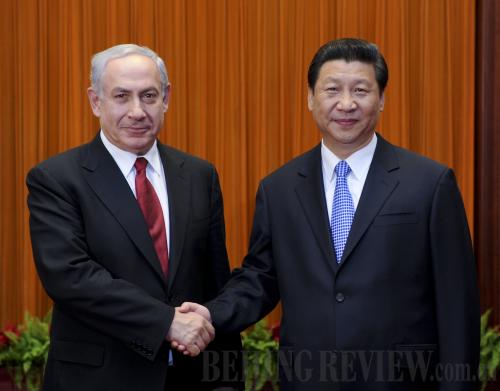|
 |
|
BEIJING MEETING: Chinese President Xi Jinping meets with visiting Israeli Prime Minister Benjamin Netanyahu on May 9 in Beijing (ZHANG DUO) |
Time to act
During the past two years, the situation in the whole Middle East has deteriorated. Libya and Egypt did not meet expectations following their power transitions, and instead descended into more turmoil. Harsh conflicts inside Syria make that country's future very gloomy. And the Iranian nuclear issue is still a ticking time bomb. Due to the ongoing financial crisis trampling most developed countries, the international community is giving less focus to the old problem between Israel and Palestine. And the peace process has faced further setbacks.
Over 60 percent of the world's energy comes from the Middle East, and the region has most crucial energy routes linking the globe. An unstable Middle East is jeopardizing the whole world's peace and stability. Without solving the Israeli-Palestinian gridlock, there will be hardly any progress in other problems in the region.
Now is a crucial time. This year marks the 20th anniversary of the signing of the Oslo Accords, a peace agreement reached between former Israeli Prime Minister Yitzhak Rabin and Palestine Liberation Organization Chairman Yasser Arafat in their secret meeting on August 20, 1993 in Norway's Oslo. It is significant for China to make diplomatic efforts to regain world focus on this question.
Compared with traditional mediators of the Palestinian-Israeli conflict, China has a unique advantage in that it has long maintained good diplomatic relations and close economic cooperation with both sides, and has gained their friendship and trust. Moreover, due to China's stance on the issue, its suggestions will be more easily accepted by the two sides.
Closer economic cooperation with the Middle East is also an important reason for China's concern in the region. China's economic and trade ties with Middle East countries, along with its influence in the region, have been growing stronger in recent years amid the world economic crisis. In 2011, China's trade volume with the Middle East was $190 billion. It is expected that the sum will mount to $350 billion-500 billion in 2020. The country is now Israel's largest trading partner in Asia and the third largest in the world, as their trade volume reached $10 billion last year.
China appointed its first Middle East envoy in 2002. Since then, the three successive Chinese envoys have conducted dozens of mediation trips during their terms.
"China is following an omnidirectional diplomatic concept with a more obvious and active attitude, and it's gradually becoming an irreplaceable contributor to ensuring world peace," said Hua Liming, former Chinese Ambassador to Iran. According to Hua, the China visits by Palestinian and Israeli leaders reflect the new Chinese leadership's focus on the situation in the Middle East as well as the growing expectations of countries in the region for China to have a clearer voice and a more constructive influence.
Hua predicted that China has the capability and opportunity to make great achievements in pushing forward the peace process in the Middle East. But he noted that the Israeli-Palestinian conflict can only be completely solved with common concerns of major political powers, especially the United States, which is the key-holder of peace talk between the two sides.
Email us at: dingying@bjreview.com | 